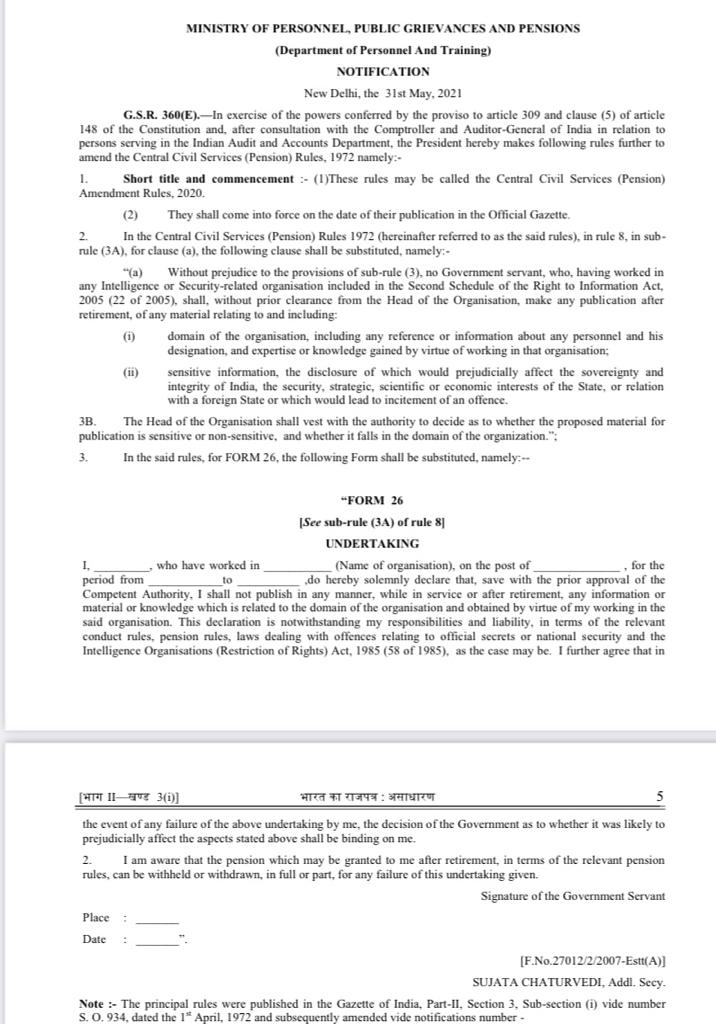Central govt amends pension rules; bars retired security officials from making public any information
New Delhi: In an attempt to stop retired security and intelligence officials from commenting critically on issues relating to current policy, Prime Minister Narendra Modi government has prohibited them from communicating to the media, or publishing any letter, or book or other document on subjects that fall within the “domain” of the organizations they served, without prior clearance.
This has been done through an amendment in Rule 8 of the Central Civil Services (Pension) Rules 1972 which deals with `Pension subject to future good conduct’. Now, any violation of the new guideline would out at risk a retired official’s pension.
The May 31, 2021 gazette notification considerably widens the ambit of the gag order earlier imposed through an amendment to pension rules in 2008. The 2008 amendment had merely made explicit existing restrictions under the Official Secrets Act and ordinary criminal law by barring retired officials from writing about “sensitive information” which would “prejudicially affect the sovereignty and integrity of India, the security, strategic, scientific or economic interests of the State… or lead to incitement of an offence”.
The new notification issued by the Ministry of Personnel, Public Grievances and Pensions – which is headed by Prime Minister Narendra Modi – says that “no Government servant, who, having worked in any Intelligence or Security-related organisation included in the Second Schedule of the Right to Information Act, 2005 (22 of 2005), shall, without prior clearance from the Head of the Organisation, make any publication after retirement, of any material relating to and including [the]:
“domain of the organization, including any reference or information about any personnel and his designation, and expertise or knowledge gained by virtue of working in that organization;”
The new prohibition placed on any writing that touches upon the “domain of the organisation… and expertise or knowledge gained by virtue of working in that organization” is so broad and vague that some retired officials from the security and intelligence establishment who comment on public affairs see this as an attempt to browbeat critics of the government into silence.
The rules already define the expression “publication” to include “communication to the press or electronic media or … publication of any book, letter, pamphlet, poster or other document, in any form.”
The 18 organisations covered by the new rule are the Intelligence Bureau, the Research and Analysis Wing of the Cabinet Secretariat, the Directorate of Revenue Intelligence, the Central Economic Intelligence Bureau, the Enforcement Directorate, Narcotics Control Bureau, Aviation Research Centre, Special Frontier Force, Border Security Force, Central Reserve Police Force, Indo-Tibetan Border Police, Central Industrial Security Force, National Security Guards, Assam Rifles, Special Service Bureau, Special Branch (CID) of the Andaman and Nicobar islands, Crime Branch-C.I.D.-CB of Dadra and Nagar Haveli and the Special Branch, Lakshadweep Police.
In effect, the new rule means former R&AW officials can no longer write articles in the media on any foreign or security related subject such as Pakistan, Afghanistan or China without prior clearance as the organization’s ‘domain’ covers them. A former Intelligence Bureau official will be barred from writing on communal violence or the mishandling of internal security issues or even domestic politics since the IB’s domain includes those. Retired officials from the CRPF, BSF etc will also find it difficult to comment on a wide range of issues on which they have expertise unless they get government permission first.
The amended pension rules include a new form that employees of these organizations will henceforth have to sign, undertaking that they “shall not publish in any manner, while in service or after retirement, any information or material or knowledge which is related to the domain of the organization and obtained by virtue of my working in the said organisation”.


